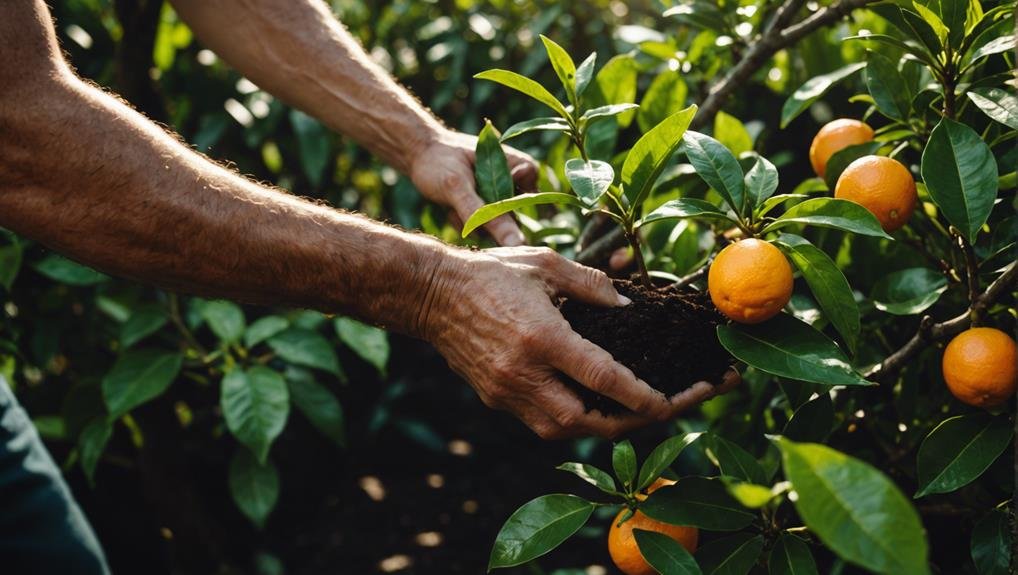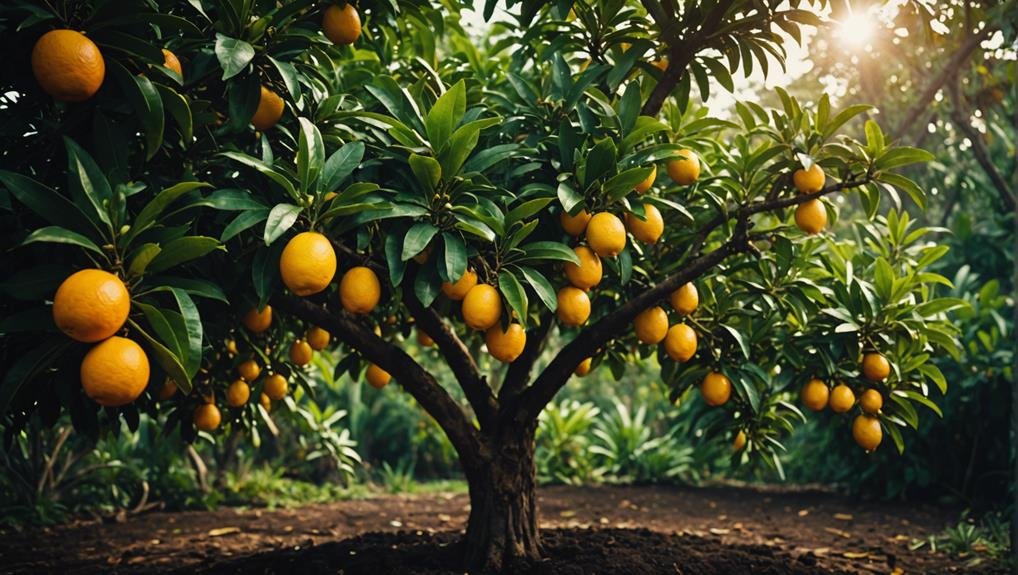Coffee grounds can improve the health of citrus trees by enriching the soil with essential nutrients like nitrogen, phosphorus, and magnesium, which support stronger growth. They also help to increase soil acidity, creating the optimal pH level for citrus trees.
Moreover, the caffeine present in coffee grounds acts as a natural deterrent for pests. However, it's important to avoid overusing coffee grounds as it can lead to soil toxicity and hinder root growth.
To maximize the benefits, mix coffee grounds into compost before application and regularly monitor soil pH levels. By following these practices, you can ensure long-term advantages such as enhanced soil structure and healthier citrus trees.
Benefits of Coffee Grounds
Coffee grounds provide numerous benefits for citrus trees, thanks to their nutrient-rich composition and soil-enhancing properties. Packed with essential nutrients like phosphorus, magnesium, nitrogen, and copper, coffee grounds play a vital role in promoting the healthy growth of citrus trees.
Moreover, these grounds help increase soil acidity, creating an ideal pH level between 6.0 and 7.0 for citrus trees to thrive. This nutrient-dense soil supports robust root development, leading to overall tree health and vigor. As a result, citrus trees grown in soil enriched with coffee grounds exhibit stronger growth, lush foliage, and improved fruit production.
Citrus Trees and Caffeine
While caffeine in coffee grounds can naturally deter pests like snails and slugs, it can harm citrus trees if used excessively. Caffeine's phytotoxic properties can impede plant growth by disrupting root development and nutrient absorption.
Citrus trees prefer a soil pH level between 6.0 and 7.0, and while coffee grounds can help maintain this acidic balance, too much can throw it off. Excessive caffeine can result in soil toxicity, posing challenges to the health of citrus trees.
Therefore, it's crucial to apply coffee grounds in moderation to ensure that the nutrients they offer don't come with excessive caffeine exposure. Understanding these dynamics is essential for optimal care of citrus trees.
Proper Application Techniques

To effectively utilize coffee grounds for the health of your citrus trees, it's crucial to apply them correctly to reap the maximum benefits while minimizing any potential drawbacks.
Begin by mixing used coffee grounds into your compost pile. This process allows the grounds to break down gradually, reducing their caffeine levels and balancing their acidity.
Once the composting is complete, spread the mixture around the base of your citrus tree, ensuring it is well blended into the top layer of soil. Avoid placing coffee grounds directly onto the soil, as high caffeine concentrations can be harmful.
Additionally, keep an eye on the soil pH levels to maintain the ideal range of 6.0 to 7.0 for citrus trees.
Monitoring Soil Health
Maintaining the health and productivity of your citrus trees requires consistent monitoring of soil conditions. It's crucial to regularly test your soil's pH to keep it within the ideal range of 6.0 to 7.0 for citrus trees.
Be cautious with coffee grounds as they can affect soil acidity, potentially pushing pH levels too high. Utilize pH testing kits or send soil samples to a lab for thorough analysis.
Keep an eye on essential nutrients like nitrogen, phosphorus, magnesium, and copper to ensure balanced soil fertility. Monitoring soil structure and drainage is also vital to prevent root issues.
Regularly check the composting process to ensure coffee grounds are fully decomposed before applying them. By staying vigilant and proactive in monitoring soil health, you can support strong growth and fruit production in your citrus trees.
Long-Term Advantages

Incorporating coffee grounds into your garden soil provides numerous long-term benefits for the health and productivity of citrus trees. By consistently using coffee grounds, you can expect the following advantages over time:
- Enhanced Soil Nutrition: Coffee grounds are rich in essential nutrients like nitrogen, magnesium, and phosphorus, which support strong tree growth.
- Improved Soil Structure: The organic matter in coffee grounds enhances soil texture, leading to better water retention and aeration crucial for root health.
- Natural Pest Control: The caffeine in coffee grounds acts as a natural repellent against pests such as snails and slugs, reducing the need for chemical interventions.
These benefits work together to promote healthier and more productive citrus trees, ensuring a flourishing and sustainable garden ecosystem.
Conclusion
Incorporating coffee grounds into the care routine of citrus trees brings multiple benefits, such as improving soil fertility and deterring pests.
However, proper management is crucial due to caffeine's dual role. It's essential to compost and apply the grounds correctly to ensure a balanced nutrient intake and optimal soil pH levels.
Regularly monitoring soil health is key to preventing any negative effects.
Over time, citrus trees will experience robust growth and enhanced vitality, making coffee grounds a valuable resource for their cultivation.












